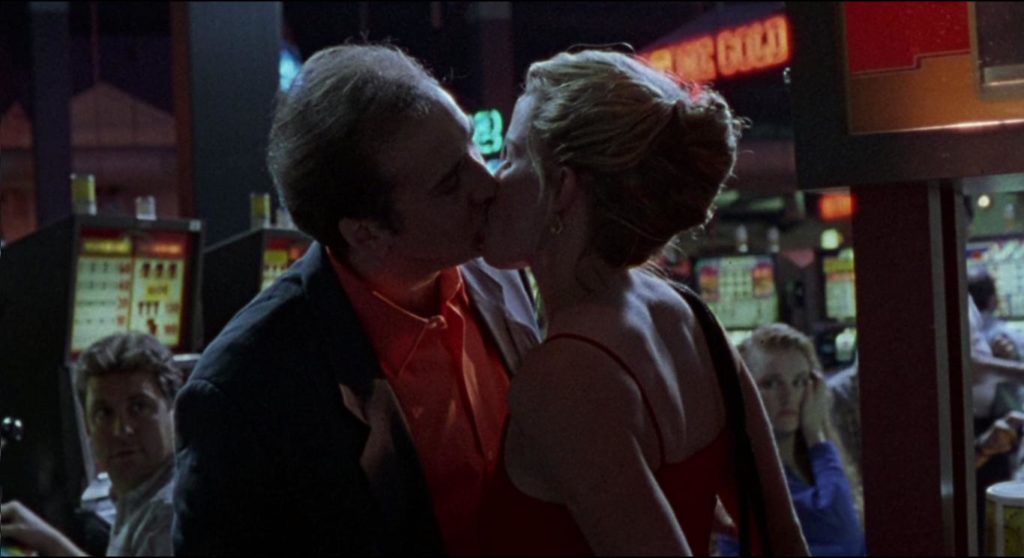
Looking back at all the awards Nicolas Cage and Elisabeth Shue either won or were nominated for in 1995 for Mike Figgis’ Leaving Las Vegas, one would assume that the film would emphasize it’s actors over familiar cinematic devices. This assumption is incorrect. Often a film with even remotely controversial material finds its actors rewarded by critics based solely on the risk to their box office appeal. Perhaps this is the cause of the accolades attributed to Leaving Las Vegas.
Leaving Las Vegas follows Ben Sanderson (Cage), an alcoholic screenwriter, during his last days as he drinks himself to death in Las Vegas. Along the way, he finds himself in a relationship with a hooker named Sera (Shue). The couple decides not to judge one another or interfere in each other’s lifestyles. Instead they hope to coexist harmoniously. That goes south when emotions start becoming a deciding factor in both of their behaviors toward one another.
This relationship, centered on self-destruction, is forfeited by Mike Figgis. Perhaps his intention was to make the film more accessible to audiences, or maybe it was too hard to articulate the complexities of this relationship on film. Relegated to the fringes are the performances of both Cage and Shue. Their acting is understated and nuanced, playing naturally into the narrative. For whatever reason, Figgis instead relies on montage and an abrasive jazz soundtrack to give his audience their emotional cues, rather than be dependent upon the work of his performers. One may suggest that such a choice is a symptom of the “rock star” status given to independent filmmakers in 1995.
Scenes are played out without any audible diegetic sound. The music in these scenes dictates the mood and atmosphere to the audience. The casino scene is a good example. Ben and Sera are gambling in a casino. Ben is ordering drink after drink at his table, where he appears to be heckling his dealer. Suddenly, he turns the table over, and security guards are bouncing him. Little of Cage’s dialogue can be heard, other than one scream as he’s dragged off. This equals the volume of the film’s score and acts as a sort of dramatic punctuation; a cue that the next scene will be riveting, confrontational, and thus demanding. Of course, the next scene is a brilliant confrontation between Cage and Shue.
The superficiality of these techniques goes even further. Another surprising result is sexual titillation disguised as affection or sympathy. The use of slow motion in sex scenes draws them out while the use of close-ups directs the viewer to wet nipples and breasts, while the soundtrack plays a familiar and tender jazz standard. The effect is something like sentimental soft-core porn, if there were such a thing.
Leaving Las Vegas has some wonderful moments; moments for which the actors seem largely responsible. But it remains tremendously difficult to assess the actor’s in Leaving Las Vegas. The plasticity and gloss of the film’s formalist qualities inhibit any more in-depth analysis.
